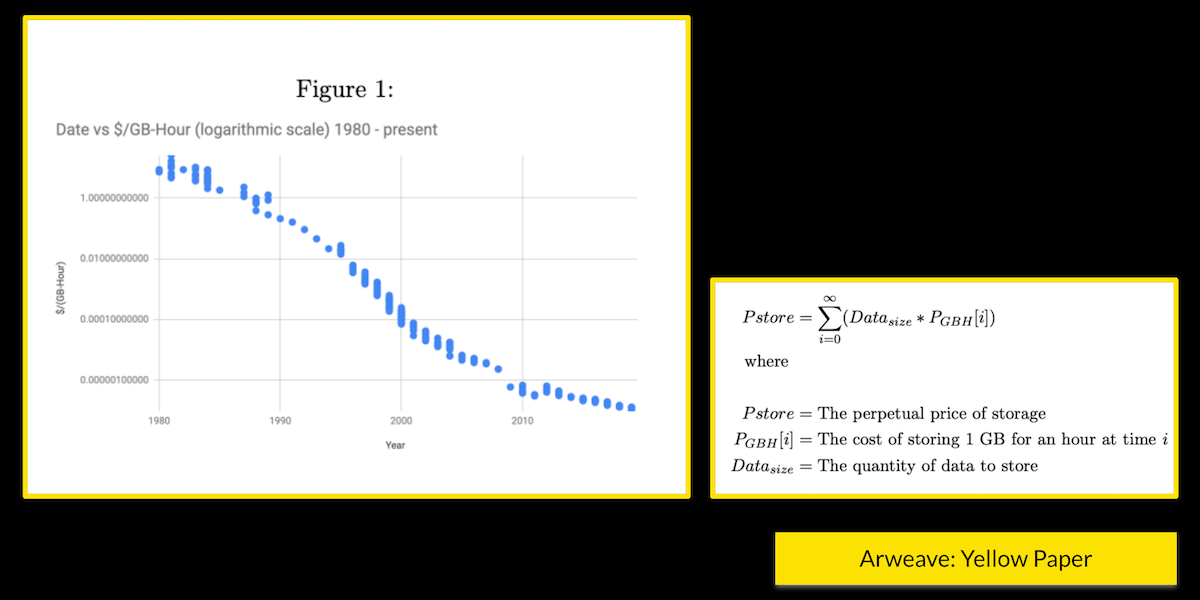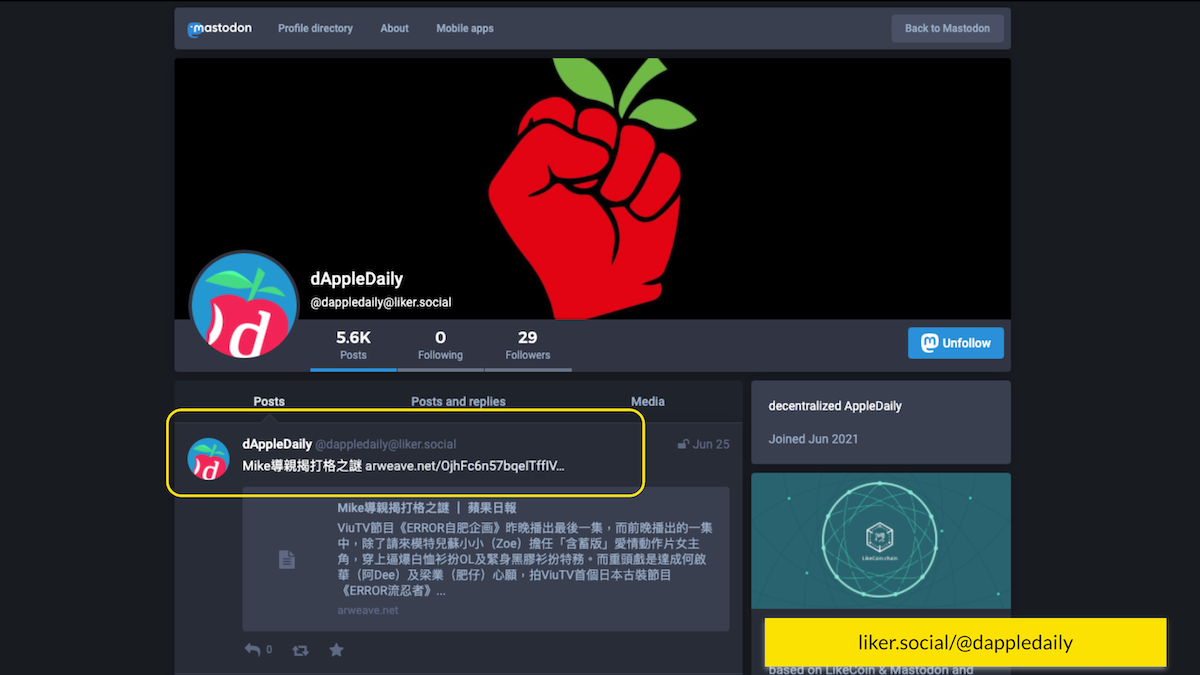dAppledaily Permanently store Apple Daily, how far is it forever?
The last issue of " RTHK Video Backup: No Hard Disk Required, But Consensus " introduced IPFS as a data access consensus mechanism, making it possible to backup without a large platform. However, participants only store data out of interest in individual content or to preserve history, so over time, the content forgotten by everyone may disappear; it is possible to generate electricity with love, but unfortunately it cannot last.
So Arweave, featured in this issue, goes one step further, providing financial incentives to ensure data perpetuity.
How far is forever?
Arweave 's vision is to build "the Library of Alexandria 2.0" on the Internet. Compared with the Library of Alexandria, which was prosperous in the 2nd and 3rd centuries BC but could not escape the destruction of the war, Arweave aims to permanently store data and construct a "permaweb".
You're probably frowning when you hear forever, "There's no such thing as forever," you thought. It's right to be critical, but please dare to imagine, first understand how Arweave intends to do it, and you might as well be romantic, otherwise, when the other half is saying forever, you rationally deny any possibility, which is not good.
First, let's get one thing clear: Although everything is more expensive under inflation, Kewang's products and services have been getting cheaper over the decades. Compared with the previous supercomputer, the phone in your hand is so cheap that ordinary people can afford it, and its performance is many times more powerful. In its yellow paper, Arweave analyzed nearly 40 years of data from 1980 and found that data storage costs are getting cheaper, dropping by an average of 30% per year. Exposure age series: In order to use dBase IV, I spent more than 2,000 Hong Kong dollars to buy my first hard drive in Gordon, NEC, with a capacity of 40 M. Yes, it's M; today, a few high-resolution photos would fill the entire hard drive.
Closer to home, since data storage is getting cheaper every year, assuming the trend continues, high school math tells us that it is possible to work out the cost of storing it forever. Don't be intimidated by the seemingly complicated formula, we don't need to discuss it, just know that it works in principle (the real reason: I've forgotten about high school math).

Why is the Nobel Prize so long?
Have you ever noticed that the annual Nobel Prize has been so long since its establishment in 1895? The answer is simple, the annual bonus comes from interest on Dr. Nobel's estate, not the principal:
The whole of my remaining realisable estate shall be dealt with in the following way: the capital, invested in safe securities by my executors, shall constitute a fund, the interest on which shall be annually distributed in the form of prizes to those who, during the preceding year, shall have conferred the greatest benefit to humankind.
Statutes of the Nobel Foundation
Arweave uses a similar mechanism. Arweave itself is a public blockchain, and the corresponding currency is called AR. Users who want to permanently store data in Arweave only need to pay once in AR. For example, I spend the equivalent of 1 cent of AR to store 1M photos in Arweave. At this time, the system will not give all these ARs to the miners at once, but will give the rest of the AR to the miners at the beginning. deposited into the fund. The cost of storage is already falling year by year, and this, combined with the returns generated by the fund, ensures that there will be enough to cover the cost of storage in the future.
Proof of Access
Many people, even if they don’t fully understand, have more or less heard of Bitcoin’s consensus mechanism, Proof of Electricity—just kidding, it’s Proof of Work. Arweave uses a variation of Proof of Work, called Proof of Access, to the effect that miners can prove that they have stored a certain amount of data before they have the opportunity to mine AR coins.
Similar to Bitcoin, Arweave miners need to find the corresponding "nonce" (number only used once) for each block, but unlike Bitcoin, what is needed to obtain this nonce is not special equipment and huge computing power, but ordinary Servers and hashrate, plus some randomly drawn old blocks.
Human words: I give some participants who have no money backed up as rewards every minute. To get these rewards, participants need to answer a question that involves some randomly selected data in history.
This clever and simple design provides an economic incentive for Arweave miners, ie participants without large backups, to store as much data as possible. This is not only, when one day the miners' hard disk is not enough to handle all the data, they will choose the data that is saved by less people, thereby increasing their chances of digging AR coins.
Continuing the above example, after I pay 1 cent of AR coins to put 1M photos in Arweave, thousands of miners’ servers will help me keep the pictures forever, not because the pictures are very interesting, but in order to mine AR coins .
dAppledaily x Arweave
The three major design priorities of storage cost, funds, and Proof of Access have made Arweave one step further than IPFS, without a large platform and continuous backup of data.
Some anonymous Hong Kong people saw this and stored a large number of appledaily.com webpages in Arweave before Apple Daily died, and the incident was widely reported overseas .
I am often asked whether Hong Kong’s blockchain application is very backward. My answer is, don’t belittle yourself, the fact is just the opposite; the situation Hong Kong faces, whether assets are frozen at any time or data is lost at any time, makes blockchain relevant. Technology and application, to the forefront of the world. In other countries, blockchain is mostly used as a icing on the cake, but here it is used to protect basic civil rights, freedom of the press and financial freedom.

I'm Reconstruction Gao , author of " Blockchain Sociology ", slash writing/teaching/entrepreneurship, exploring freedom of the press , financial freedom , and democratic freedom , published every Friday in #decentralizehk Weekly.
These articles are fully open and aimed at popularizing knowledge; if you believe in value, don't punish openness and encourage closure, please pay for a subscription and support me to keep doing it.
Like my work? Don't forget to support and clap, let me know that you are with me on the road of creation. Keep this enthusiasm together!








- Author
- More